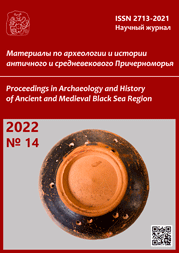Фибулы с эмалью второй половины I—III вв. из памятников Кабардино-Пятигорья
Enamel fibulae in Kabarda-Beshtau, 1st to 3rd century
Author(s): Yuriy A. ProkopenkoSubject(s): Archaeology, Ancient World
Published by: Нижневартовский государственный университет
Keywords: fibulas; brooches; shield; enamel; posts; needle; sarmatians; Roman-provincial production;
Summary/Abstract: The article considers seven bronze fibulae decorated with enamels. They have been discovered in the late 19th century, in the 1970s, and in the early 21th century in the foothill area of the Central Caucasus (Kabarda-Beshtau). Fasteners No. 1 and 2 come from E. Zichi’s collection (the late 19th century, from the area around the Chegem River and the Baksan River); one of them is a hinged arched fibula, and another is an arched fibula with a two-bar hinge. Brooches No. 3—5 have geometric shields and two-bar hinges; these were found by A.P. Runich in the vicinity of Kislovodsk. Brooch No. 6 was found within the excavation unit area at Zayukovo-3 burial ground. This one has a flat rhombic shield supplemented with zoomorphic bulges on four sides, its hinge two-bar in kind; a needle of this brooch has not been preserved. Fibula No. 7 is shaped like a shoe sole. It was revealed in a Sarmatian time occupation layer of the hillfort near Kalezh Mount in the vicinity of the village of Kamennomostskoye. Fibulae No. 2 and 3 are eclectic forms displaying elements characteristic for (a) plate brooches with figurative zoomorphic margins and bird figurines on their shields, (b) fasteners with transverse rectangular enamel inlays, and (c) flat annular shield fasteners with four symmetrically placed bulges shaped like animal heads. Fibula No. 6 represents a rare form of personal ornaments; in the North Pontic area, it is only the second time that an item like this has been reported to be found. Typological analysis of the enamelled brooches under study indicates that they were manufactured in the Roman provinces within the time range from the late half of the 1st century until the 3rd century. Their emergence in Kabarda-Beshtau is associated either with Sarmatian raids in northern Dacia, or with the presence of a Sarmatian group allied to Rome in Roman fortresses, or, finally, with a military clash of the Alans of Don with the Goths in the Northern Black Sea region in the early 3rd century.
Journal: Материалы по археологии и истории античного и средневекового Причерноморья
- Issue Year: 2022
- Issue No: 14
- Page Range: 140-154
- Page Count: 15
- Language: Russian

